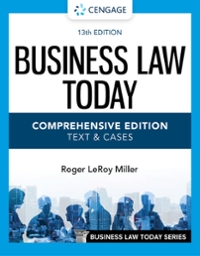Heesham Broussard obtained counterfeit money instruments. To distribute them, he used account information and numbers on compromised
Question:
Heesham Broussard obtained counterfeit money instruments. To distribute them, he used account information and numbers on compromised FedEx accounts procured from hackers. Text messages from Broussard indicated that he had participated previously in a similar scam and that he knew the packages would be delivered only if the FedEx accounts were “good.” For his use of the accounts, Broussard was charged with identity theft.
In defense, he argued that the government could not prove he knew the misappropriated accounts belonged to real persons or businesses.
1. Does the evidence support Broussard’s assertion? From an ethical perspective, does it matter whether he knew that the accounts belonged to real customers? Why or why not?
2. Assuming that FedEx knew its customers’ account information had been compromised, use the IDDR approach to consider whether the company had an ethical obligation to take steps to protect those customers from theft.
Step by Step Answer:






